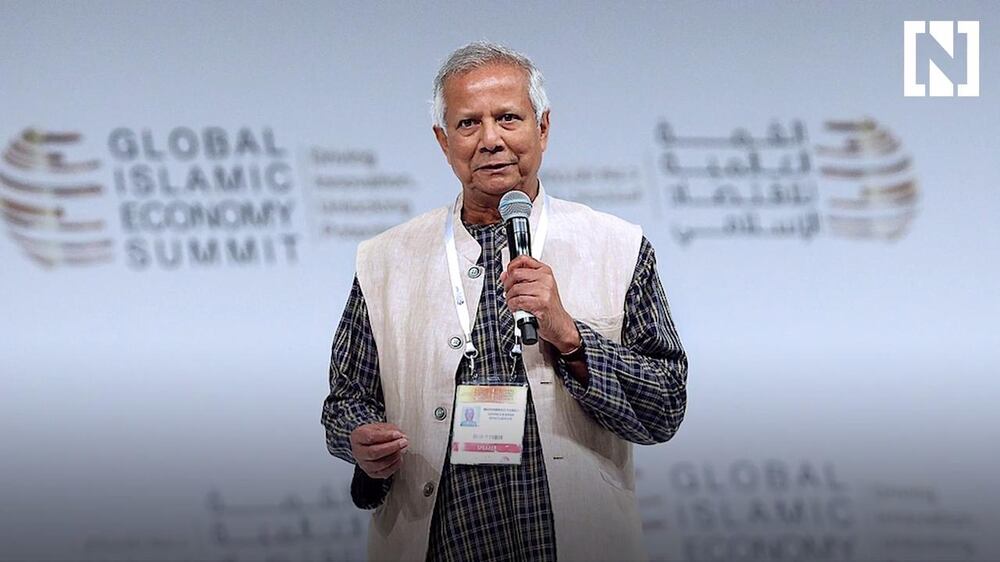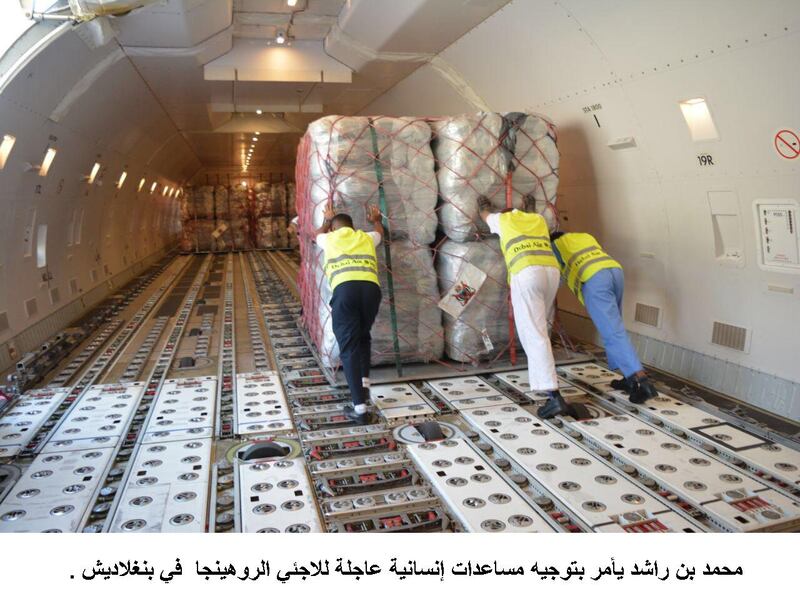Hundreds of tonnes of aid from the UAE will be distributed to Rohingya refugees in Bangladesh on Wednesday.
Two emergency aid flights - one sponsored by Sheikh Mohammed bin Rashid and the other by the UNHCR - left the UAE on Tuesday carrying emergency relief for 25,000 refugees.
.@HHShkMohd orders urgent aid to Rohingya refugees in Bangladesh in support of UNHCR's efforts to alleviate the suffering of the refugees pic.twitter.com/PMSW7Be8GB
— Dubai Media Office (@DXBMediaOffice) September 12, 2017
The first flight, a UNHCR-chartered Boeing 777, delivered 1,671 family tents, worth around Dh2.7m, which will provide shelter for some 8,355 refugees.
It carried 91 tonnes of aid including much needed shelter materials, jerry cans, blankets, sleeping mats and other essential items from UNHCR’s global stockpile in Dubai.
The second flight was organised by the Vice President and Ruler of Dubai, which carried almost Dh827,000 worth of emergency aid provided by the UNHCR to Bangladesh, according to Adrian Edwards, a spokesperson for the UNHCR.
The cargo has been loaded onto trucks which will bring the aid to the refugee camps at Cox’s Bazar in south-eastern Bangladesh, Mr Edwards said.
The aid shipments come at a time when the capacity of Bangladeshi refugee camps in Kutupalong and Nayapara has been overwhelmed, and refugees have been forced to temporarily stay in makeshift shelters alongside roads.
Muhammad Yunus speaks out on the Rohingya

Toby Harward, head of UNHCR’s office in UAE said “the UAE, and the facilities at International Humanitarian City in Dubai, is a critical logistical hub that allows UNHCR to respond rapidly in times of emergency. The country's leadership has repeatedly responded generously to the many humanitarian challenges that we face today."
Further flights are being planned, delivering emergency aid for some 120,000 refugees in total.
It is not the first time the Ruler of Dubai answers the call for humanitarian aid.
Earlier this year, Sheikh Mohammed bin Rashid and Princess Haya of Jordan funded airlifts of core-relief items for South Sudanese refugees in Uganda.
Meanwhile, thousands of Rohingya Muslim refugees who fled violence in Myanmar could be forced to make their new homes on a barren Bangladeshi island that floods every year.
The Bangladeshi government appealed for international support to move the Rohingya to the island as the impoverished country confronts a growing crisis over where to house the influx following a military crackdown in Buddhist-dominated Myanmar's Rakhine state.
________________
Read more:
[ Myanmar operation against Rohingyas textbook ethnic cleansing, says UN rights chief ]
[ Violence has driven away nearly half of Myanmar's Muslims in less than a year ]
[ Muslim leaders call for immediate aid for Rohingyas ]
________________
More than 300,000 Rohingya have poured into Bangladesh since the latest flare in violence on August 25, adding to around 300,000 refugees already living in overflowing UN-run camps in Cox's Bazar district, close to the border with Myanmar.
Refugees are continuously arriving at Kutupalong and Nayapara camps, where the UNHCR operates. With more than 70,000 refugees now in both camps, the total population has more than doubled since August.
Some of the refugees already living in the camps are now hosting up to 15 newly-arrived families in their small huts with more spilling onto walkways under plastic sheets.
The UNHCR said it has opened up "public buildings and set up large tents to accommodate the new arrivals".
"Many of the new refugees are staying in the makeshift settlements or among local Bangladeshi host communities who generously share whatever resources they have," Mr Edwards said.
He said the spontaneous sites required proper planning to ensure basic shelter, safety and hygiene standards.
UNHCR’s Assistant High Commissioner for Operations, George Okoth-Obbo is set to meet with Rohingya refugee families in Cox’s Bazar to better understand their needs and review the UNHCR’s response.
He is also scheduled to meet with Bangladeshi authorities to underline UNHCR's readiness ramp up its response and provide support to the government in addressing the humanitarian needs and ensuring the protection of refugees.







